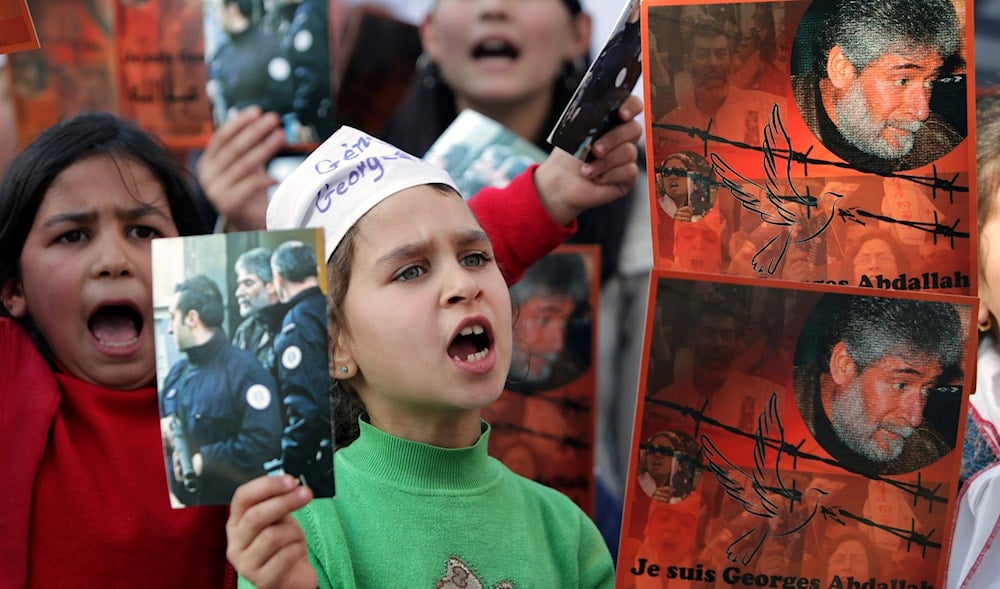Georges Abdallah faces decisive court session in Paris on Thursday
As French authorities weigh release conditions, pressure mounts from rights groups and Lebanon over the prolonged detention of Georges Abdallah.
-

Supporters of Lebanese Georges Ibrahim Abdallah hold up his portrait with Arabic reading: "I'm Georges Abdullah," during a sit-in near the US Embassy, Beirut, Lebanon, Friday, Dec. 28, 2012 (AP)
A pivotal court session will be held Thursday in Paris that could determine the fate of Georges Ibrahim Abdallah, the Lebanese activist and revolutionary who has spent over four decades imprisoned in France, 25 of those years described by legal experts and human rights advocates as unlawful detention.
Abdallah, 74, has long been eligible for release under French law. In November, an enforcement court ruled in favor of his release, concluding that he “no longer poses a serious threat if released.” However, the decision was frozen following an appeal by France’s national anti-terrorism prosecutor, delaying what supporters say is long-overdue justice.
The upcoming session follows a February 20 hearing that was postponed when the court ruled that Abdallah must first pay part of the compensation awarded to the families of the American and Israeli diplomats assassinated in Paris in 1982. Abdallah has consistently rejected this demand, insisting he had no involvement in the assassinations, a stance he and his defense team have maintained throughout his imprisonment.
Speaking to Al Mayadeen, Abdallah’s attorney, Jean-Louis Chalanset, expressed cautious optimism ahead of the hearing, noting that there has been “some progress” on the contested compensation issue. “There is a glimmer of hope,” he said.
According to Al Mayadeen, the defense informed the court that Abdallah currently has €16,000 in his bank account, without specifying the origin of the funds, potentially signaling a willingness to satisfy the court’s precondition, or at least challenge it on legal grounds.
Lebanon is ready to receive Abdallah
In a separate development, the French Interior Ministry has reportedly reached out to the Lebanese Embassy in Paris to coordinate the logistics of a potential release. According to diplomatic sources cited by Al Mayadeen, the embassy confirmed Lebanon’s readiness to receive Abdallah and cover his travel expenses if French authorities approve his release.
The case of Georges Abdallah remains one of the most politically charged detention cases in modern French history. Originally arrested in 1984 and sentenced to life in 1987, he has been eligible for parole since 1999. Despite repeated legal victories and the support of international human rights organizations, successive French governments, under pressure from Washington and "Tel Aviv", have refused to sign off on his release.
As the court reconvenes this week, supporters, legal observers, and human rights advocates will be watching closely, viewing the hearing as a test of France’s judicial independence and its commitment to due process after decades of politically influenced delays.
Who is Georges Abdallah?
Abdallah, a former member of the Popular Front for the Liberation of Palestine (PFLP), has so far served 40 years in prison, which makes him the longest-held prisoner in Europe.
He founded the Marxist-Leninist Lebanese Armed Revolutionary Factions (LARF), which claimed responsibility for four operations in France during the 1980s.
The Lebanese revolutionary was accused of taking part in the assassination of US military attache Charles Robert Ray and Israeli diplomat Yacov Barsimantov in 1982 and was sentenced on these accusations.
Abdallah never responded to the list of accusations and considered that the French judicial system was "despicably" taking the resistance action out of context.
At his trial for the alleged killing of the diplomats, Abdallah was handed a life sentence, significantly harsher than the 10 years sought by prosecutors. His lawyer, Jacques Verges, called the sentence a "declaration of war."
Abdallah maintains that he is a "fighter" advocating for Palestinian rights, not a "criminal".
He became eligible for parole in 1999, but all previous applications were denied, except in 2013, when his release was conditioned on expulsion from France.
However, then-Interior Minister Manuel Valls refused to implement the order, keeping Abdallah in prison.

 4 Min Read
4 Min Read








